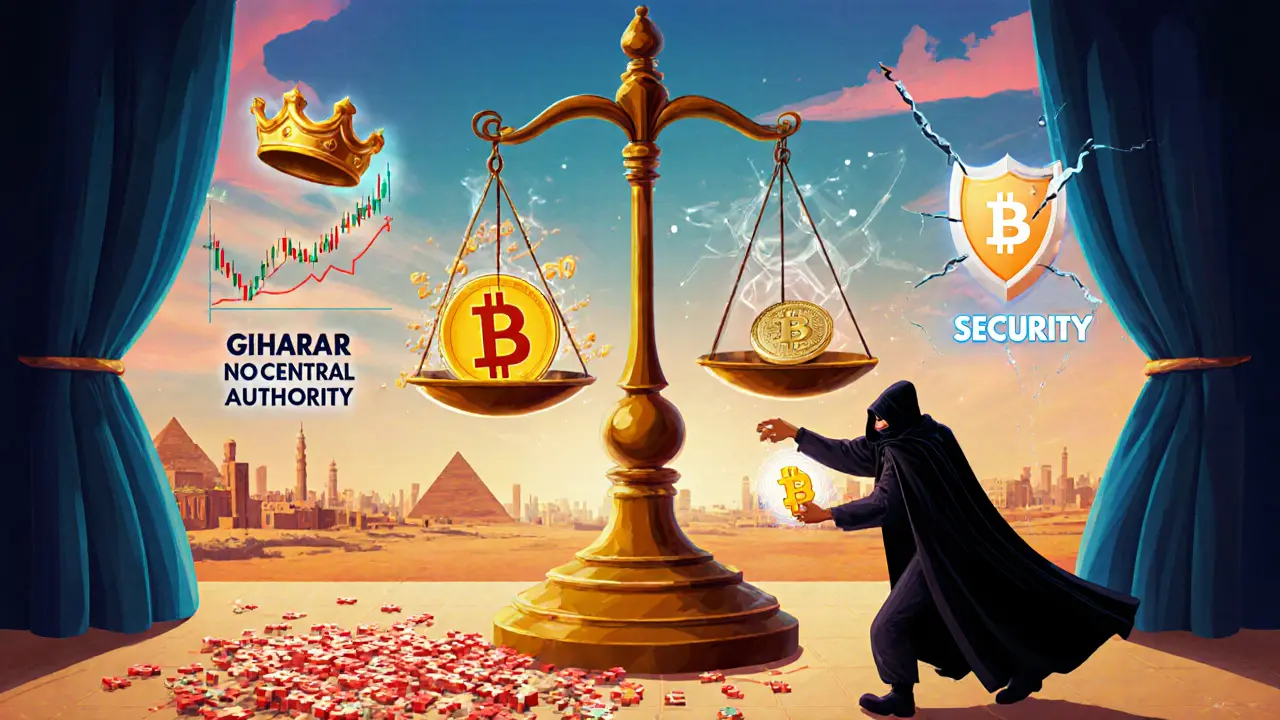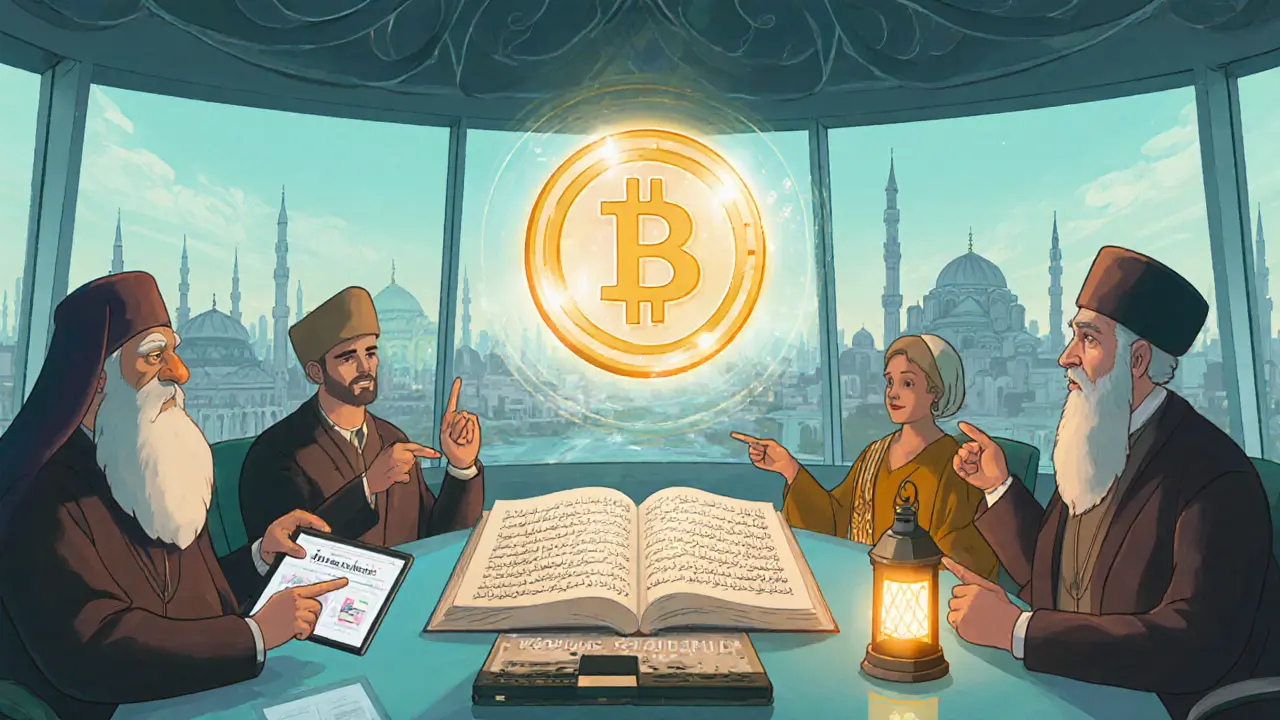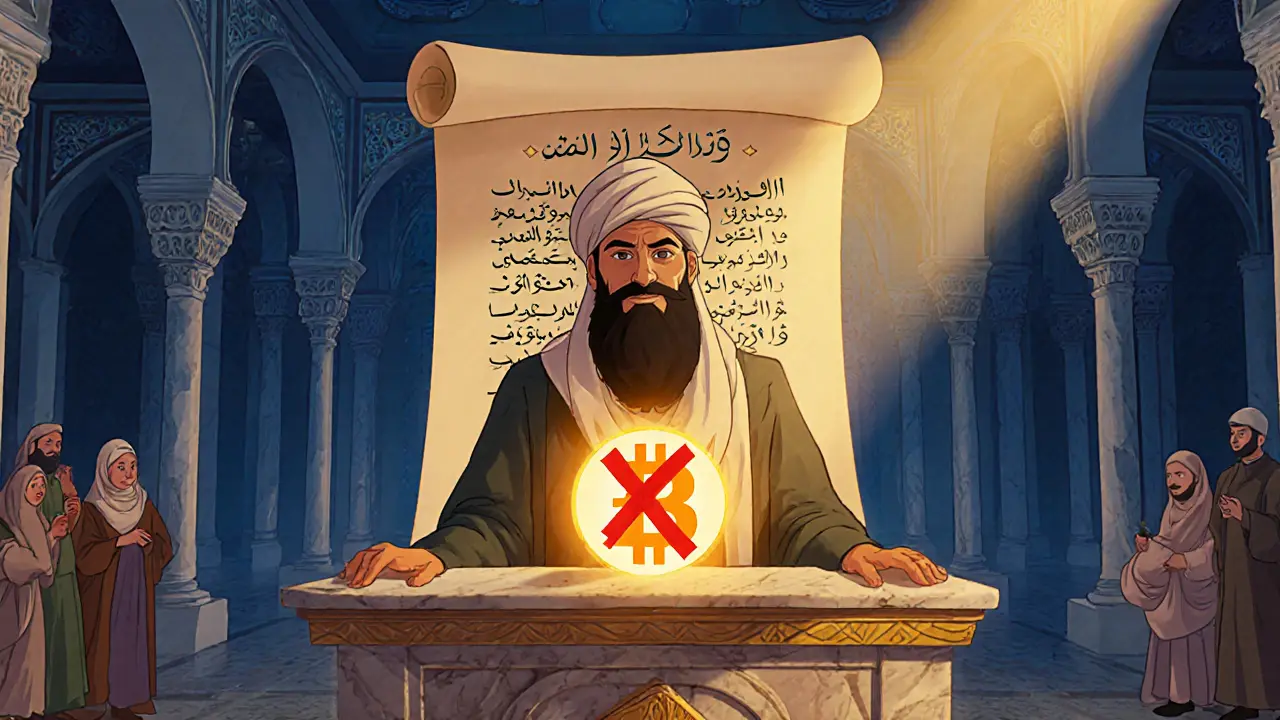Egyptian Grand Mufti Bitcoin Fatwa - Compliance Checker
Select Your Scenario:
As a Muslim Investor
Learn what the fatwa says about holding or trading crypto assets.
As a Business Owner
Find out if accepting crypto payments is allowed under the fatwa.
As a Crypto Miner
Understand the religious implications of mining crypto.
General Information
Get an overview of the fatwa's core reasons and impact.
Select a scenario above to see detailed information about the fatwa's implications.
Click on one of the cards to explore how the 2017 Egyptian Grand Mufti's ruling affects your crypto activities.
When Egyptian Grand Mufti Bitcoin fatwa hit the headlines in December 2017, the crypto world got a stark reminder that religious law can shape financial behavior just as powerfully as regulation.
Shawky Ibrahim Allam is the current Grand Mufti of Egypt, appointed in 2013 to replace Ali Gomaa. He earned a PhD from the Faculty of Sharia and Law at Al‑Azhar University, the oldest Islamic university in the world. In December 2017, through the state‑run Dar al‑Ifta (the Fatwa House established in 1895), Allam issued a comprehensive ruling that Bitcoin and all similar digital tokens are haram-religiously forbidden.
Why the Fatwa Calls Bitcoin Haram
The ruling hinges on three core Sharia concepts:
- Gharar - excessive uncertainty or ambiguity in a contract. Bitcoin’s price swings and lack of intrinsic value were deemed classic gharar.
- Absence of a recognized central authority that can guarantee stability, a key requirement for a legitimate medium of exchange.
- Potential for use in illicit activities, such as financing ISIS or money‑laundering networks, which violates the Islamic principle of maslahah (public interest).
Allam specifically wrote that Bitcoin is "not considered an accepted medium of exchange from the relevant authorities" and that its "electronic nature and lack of tangible form" break the requirement for a clear, observable asset.
Technical Reasoning Behind the Ruling
From a financial‑law perspective, the fatwa points to several technical red flags:
- Bitcoin is a decentralized ledger with no physical backing - it cannot be held, measured, or insured like gold or fiat.
- Transactions occur entirely online, making them vulnerable to hacking and cyber‑theft, which the fatwa describes as a "penetration for cybersecurity and protection" issue.
- The lack of a regulating body means there is no mechanism for consumer protection, which conflicts with the Islamic duty to avoid harm (sadd al‑dhara'i - blocking harmful means).
All these factors combine to create a high‑risk product that the Grand Mufti deemed unsuitable for Muslims.

How the Fatwa Differs from Other Islamic Opinions
Islamic scholars are not monolithic on crypto. Below is a quick contrast between Egypt’s position and two other notable rulings.
| Authority | Year | Core Reasoning | Outcome |
|---|---|---|---|
| Egyptian Grand Mufti (Dar al‑Ifta) | 2017 | Gharar, no central regulator, security risks, illicit use | All crypto activities declared haram |
| Syrian Islamic Council | 2018 | Uncertainty (gharar) and lack of legal tender status | Prohibits trading but allows holding as a non‑currency asset |
| Mufti Faraz Adam (FinTech researcher) | 2020+ | Focus on functional utility, potential for regulated, Sharia‑compliant tokens | Allows crypto if screened for compliance; zakat payable on holdings |
The Egyptian view is the most restrictive, while scholars like Adam argue that as regulation matures, crypto could fulfill the Sharia criteria of a real asset.
Practical Impact on Muslims in Egypt and Beyond
For everyday believers, the fatwa translates into concrete prohibitions:
- No buying, selling, or leasing of Bitcoin or any similar token.
- Mining operations are illegal because they generate “haram” income.
- Businesses cannot accept crypto as payment for goods or services.
- Financial institutions must block crypto‑related transactions on their platforms.
Because al‑Azhar’s authority spreads across the Sunni world, many banks and Islamic finance firms in neighboring countries reference the Egyptian ruling when forming their own compliance policies. As a result, a sizable segment of Muslim investors remains on the sidelines of the booming crypto market.
What About Other Islamic Finance Concepts?
Two concepts often arise when discussing crypto legality:
- Zakat - the annual almsgiving. Scholars who deem crypto permissible argue that it should be counted as wealth and therefore subject to zakat, typically 2.5% of its market value.
- Riba - usury or unjustified gain. Since Bitcoin does not generate interest by itself, most scholars agree it isn’t riba, but speculative trading can border on gambling (qimar).
These nuances are why the debate continues: the Egyptian fatwa treats the speculative and security aspects as enough to label the whole ecosystem haram, whereas other jurists separate the asset from the activity.

Future Outlook: Will the Fatwa Ever Change?
Since its issuance, Egypt’s Grand Mufti has not publicly revisited the ruling, even as global regulators introduced clearer frameworks for crypto exchanges, AML/KYC standards, and even Central Bank Digital Currencies (CBDCs). The fatwa’s language-"any and all uses of cryptocurrency"-suggests it could be applied to newer, more regulated tokens as well.
However, a growing body of Islamic fintech research argues that as long as a digital token meets three criteria-real utility, transparent governance, and compliance with anti‑money‑laundering rules-it could be re‑examined under the principles of maslahah (public interest) and urf (customary practice). If many Muslim-majority economies adopt regulated crypto platforms, the pressure to issue a more nuanced fatwa may increase.
Until then, the Egyptian edict remains a powerful legal and religious barrier for Muslims who wish to trade or invest in crypto.
Key Takeaways for Muslim Crypto Enthusiasts
- Egypt’s Grand Mufti has declared all cryptocurrency transactions haram since 2017.
- The ruling is based on gharar, lack of central oversight, and security concerns.
- Other scholars offer more permissive views, often requiring compliance screening and zakat payment.
- Practical compliance means avoiding buying, selling, mining, or accepting crypto for services in Egypt.
- Future regulatory clarity could spark a re‑evaluation, but no official shift has been announced.
Frequently Asked Questions
Is Bitcoin illegal in Egypt or just religiously forbidden?
The fatwa does not create a civil crime, but it declares Bitcoin haram, which means Muslims are religiously prohibited from using it. The Egyptian government also enforces financial regulations that ban crypto exchanges, effectively making it illegal for the public.
Can I hold Bitcoin as an investment if I’m Muslim?
According to the Grand Mufti’s ruling, holding Bitcoin for speculation is also haram because it involves uncertainty and potential illicit use. Scholars who allow holding usually require the token to be screened for Sharia compliance and to pay zakat on its market value.
What about other cryptocurrencies like Ethereum or stablecoins?
The Egyptian fatwa uses the term "cryptocurrency" in a blanket fashion, covering Bitcoin, Ethereum, stablecoins, NFTs, and any future digital token. Therefore, the same prohibition applies unless a new, specific fatwa is issued.
If I’m a business owner, can I accept crypto payments from foreign customers?
No. The fatwa forbids Muslims from receiving, selling, or exchanging cryptocurrency. Accepting foreign crypto payments would be considered a prohibited transaction.
Is there any chance the fatwa will be revised?
So far, the Grand Mufti has not signaled a review. However, as global regulation improves and Islamic fintech scholarship evolves, pressure may build for a more nuanced ruling. Until then, the original decree stands.



Kate O'Brien
Yo, have you ever thought the whole crypto thing is a distraction? They push Bitcoin like it’s a miracle, but it’s really a tool for the shadow banks to move money under the radar. The fatwa is just the tip of the iceberg – there are hidden agendas behind every regulation. It feels like they’re scared of losing control over the global finance game.
Ricky Xibey
Sounds like the mufti just wants to keep us stuck in old cash.
Sal Sam
From a compliance standpoint, the issuance of the 2017 fatwa represents a categorical prohibition, aligning with Islamic jurisprudence on gharar and the absence of a sovereign guarantor. Consequently, any transaction classified under a decentralized ledger is deemed non‑sharia compliant, thereby invalidating its status as a permissible financial instrument.
Moses Yeo
Ah, the grand tapestry of religious edicts-woven with threads of fear, certainty, and the eternal quest for moral superiority; yet, one must ask: does the prohibition of a digital token truly safeguard the ummah, or does it merely reflect an aversion to the unknown? In any case, the argument teeters on the brink of philosophical paradox, where certainty becomes the very illusion we seek to avoid.
Lara Decker
That's just overblown; the fatwa is a blunt instrument, nothing more.
Anna Engel
Oh great, another “expert” telling us that Bitcoin is the devil’s spreadsheet. Because clearly, the only thing that matters is whether a cleric can pronounce “haram” without understanding the tech.
manika nathaemploy
i feel u, but tbh the whole thing is confusing. many people just want clear guidance, and the fatwa kinda leaves them hanging. hope there’ll be more nuanced take soon.
Mark Bosky
In light of the fatwa, it is advisable for practitioners to seek alternative investment avenues that conform to Sharia principles. Diversification into commodities, real estate, and interest‑free financing structures can provide comparable returns while ensuring religious compliance.
Debra Sears
It’s understandable that many feel unsettled by the ruling; seeking guidance from knowledgeable scholars and exploring compliant financial products can help bridge that gap.
Brian Lisk
Reading through the Grand Mufti’s 2017 decree, one cannot help but notice how it mirrors the broader anxiety surrounding technological disruption in traditional societies. The declaration that Bitcoin is haram rests on the three pillars of gharar, lack of central authority, and potential illicit use, each of which is rooted in centuries‑old jurisprudential concepts. While the concern over uncertainty is legitimate, it overlooks the fact that conventional currencies also experience volatility yet are broadly accepted. Moreover, the argument about the absence of a central regulator fails to consider that modern fiat money itself is a construct without intrinsic value, sustained only by state backing. The fatwa further emphasizes the risk of financing terrorism, yet it does not provide concrete evidence linking Bitcoin to such activities more than any other financial tool. By casting the entire ecosystem in a negative light, the ruling potentially stifles innovation that could benefit Muslim economies through financial inclusion. Critics argue that a more nuanced approach, perhaps differentiating between speculative trading and legitimate utility, would better serve the community. Nevertheless, the fatwa’s blanket prohibition sends a clear signal to financial institutions: avoid crypto at all costs. This has already prompted banks in the region to block crypto transactions, impacting not only traders but also remittance services that could have leveraged blockchain efficiency. From a theological standpoint, the emphasis on protecting the public interest (maslahah) aligns with the principle of preventing harm, yet it may also reflect a conservative bias towards familiar monetary frameworks. In practice, the ruling has forced investors to seek offshore platforms, thereby exposing them to unregulated risks the fatwa aimed to mitigate. The broader implication is a chilling effect on fintech startups that could have contributed to economic diversification. Some scholars suggest that as regulatory clarity emerges globally, a reevaluation of the fatwa may become inevitable. Until such a dialogue occurs, the edict remains a powerful barrier for Muslims considering entry into the crypto market. Ultimately, the tension between tradition and innovation continues to shape the discourse, and only time will reveal whether the prohibition stands the test of evolving financial realities.
Richard Bocchinfuso
i cant believe people still chase that shiny tech when it clearly leads to sin and greed.
Melanie LeBlanc
You’ve captured the spirit of the debate beautifully, weaving together vibrant imagery and thoughtful critique. Your words paint a clear picture of the challenges faced by believers navigating this digital frontier. It’s refreshing to see such eloquence paired with genuine concern for ethical finance.
Don Price
The irony is palpable; while we praise colourful rhetoric, the underlying truth remains that a covert coalition of global elites is steering the crypto narrative to erode traditional value systems. This isn’t just about money-it’s about cultural hegemony, a subtle subversion of long‑standing moral frameworks. By labeling digital assets as haram, the mufti inadvertently shines a spotlight on the very forces trying to diminish religious authority. The same powers that lobby for unrestricted blockchain deployment also fund think‑tanks that downplay the risks of speculative bubbles. Consequently, the fatwa becomes a double‑edged sword: a protective decree for the faithful, yet a rallying banner for those who profit from fear. In the grand scheme, we must ask whether the prohibition serves divine intent or merely reflects geopolitical maneuvering. Regardless, the moral imperative to safeguard the community remains paramount, even as hidden agendas swirl beneath the surface.
Jasmine Kate
This whole thing feels like a soap opera-dramatic proclamations, endless accusations, and a cast of characters pointing fingers at each other. The mufti’s statement is the latest plot twist, and everyone jumps on the bandwagon, screaming about morality while ignoring the actual economic impact. It's pure theater, and the audience is left to untangle the mess.
Mark Fewster
Indeed- the drama, the accusations, the endless cycles; all of it underscores how deeply intertwined belief systems and financial innovation have become; yet, perhaps, we should seek calm amid the storm; reason might yet prevail.
Monafo Janssen
It's great to see so many perspectives on this issue; staying open‑minded helps us all learn and grow.
Jason Duke
Absolutely! Let's push forward, challenge outdated rulings, and show that progress can coexist with faith; we must be bold, we must be loud, we must demand change!!!
Nicholas Kulick
The fatwa highlights key Sharia concerns, but practical compliance can be achieved through rigorous token screening and zakat calculation.